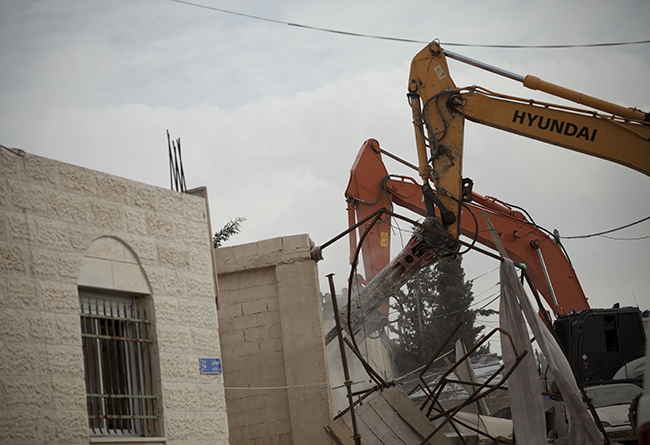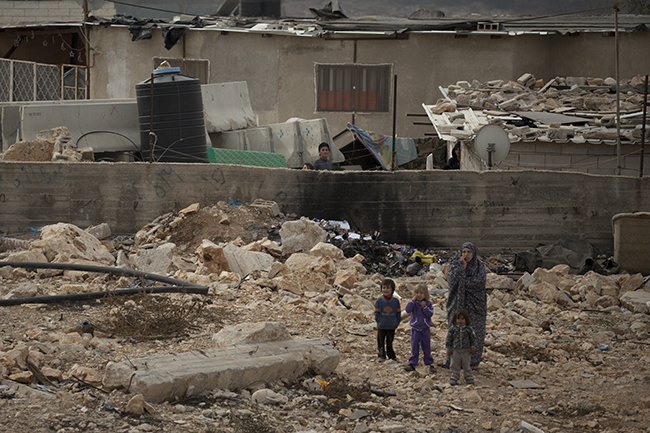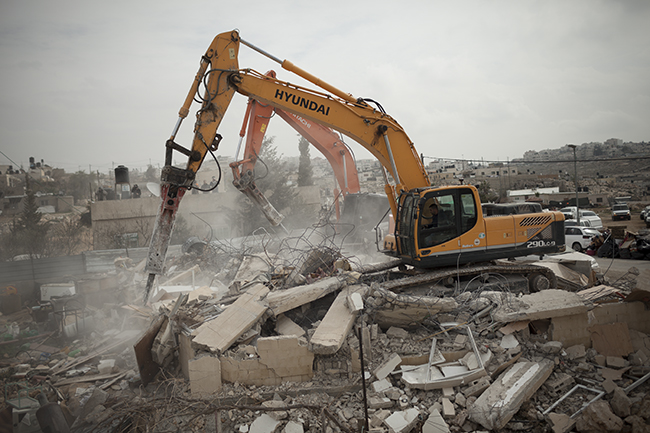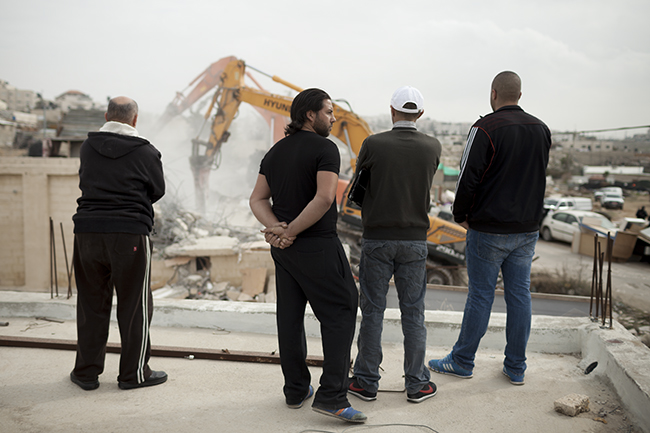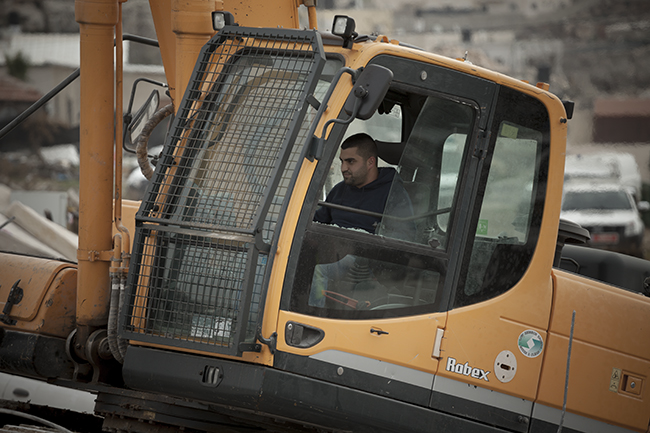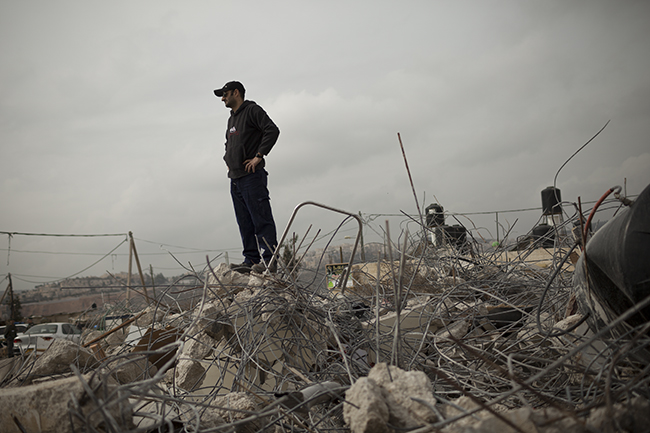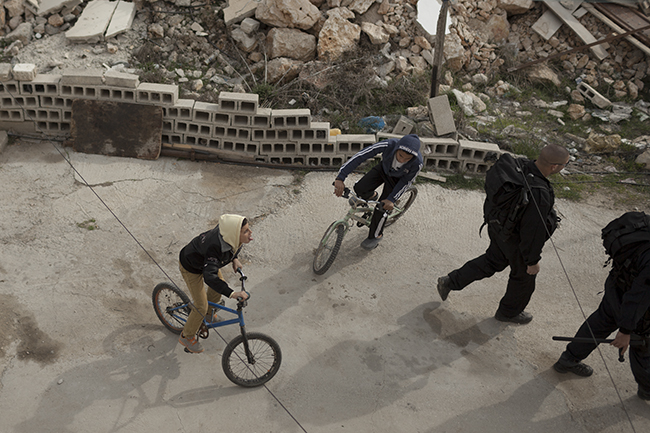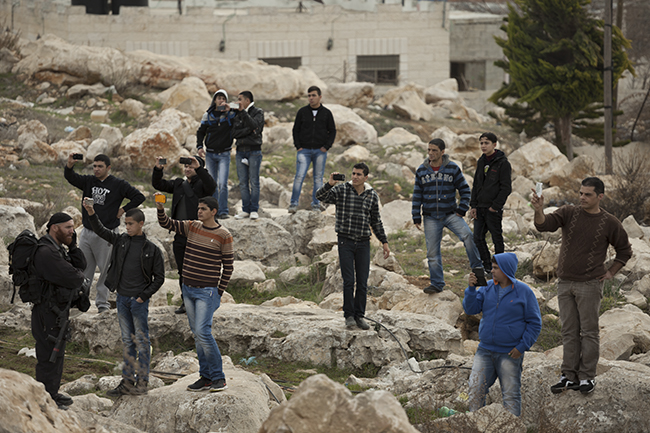Beit Hanina, East Jerusalem – 27th of January, 2014: Palestinian youths seen as Israeli police forces and bulldozers demolish the house of the Adjluni family, allegedly for having been built illegally. House demolitions are a sore point in the relationship between the Jerusalem municipality, which claims to be simply enforcing the law, and its Palestinian residents who see them as part of an ongoing effort to slowly displace them from the city in order to maintain a Jewish majority, a goal which is in fact official policy.
With at least 500 buildings demolished in the past ten years and several thousands people left homeless, house demolitions are a fact of life in East Jerusalem, an area conquered by Israel in the 1967 war. Its de facto annexation, described in Israeli consciousness as the “reunification” of a previously divided city, has never been recognized by the international community in an attempt to not legitimize the acquisition of territory by force. Offered full citizenship like the rest of Israel’s Palestinian minority, the inhabitants of East Jerusalem refused to accept it and become “permanent residents” instead, with Israeli IDs and the right to vote in local elections, but without passports or political representation at the national level.
Since 1967, Israeli authorities have implemented a somewhat ambiguous policy towards East Jerusalem, preferring to invest in establishing numerous new Jewish neighbourhoods rather than improving the Palestinian ones and building a massive network of infrastructure linking the area to West Jerusalem and to the rest of Israel. At the same time, and especially since the completion of the Security Wall, East Jerusalem has been cut-off from the West Bank and the hypothetical future Palestinian state, of which it is supposed to be the capital city – a prospect that today appears dubious to say the least.
Alongside Israeli sovereignty came Israeli planning and zoning regulations, which have proven to be quite restrained when it comes to allowing the Palestinian residents of East Jerusalem to build new housing. Through a combination of lack of town plans, without which it is impossible to grant permits, and the designation of vast areas as “open spaces” or “national parks” on which construction is made illegal, it is extremely hard and costly to get a building permit in the Palestinian neighbourhoods, which in any case are restricted to that 65% of the land which has not expropriated and reserved for the “rebuilding of Jewish Jerusalem”.
Together with the sustained growth of the Palestinian population, which since 1967 has almost quadrupled, these restrains on construction have created an immense demand for new housing which could only be dealt with in two ways: either by leaving the city, an act seen by many Palestinians as consenting to silent expulsion, or through widespread illegal construction, which has led to the overwhelming majority of the houses in East Jerusalem to be built illegally and therefore at risk of being demolished by the municipality, with several thousands having demolition orders hanging over them at any given time.
Periodically and apparently without a clear logic, some of these orders are put into practice, usually on a very short notice, if there is any, and under heavy police escort. Because of the large size of Palestinian families and of the overcrowding caused by the lack of housing and space, demolishing a house can mean making ten or even twenty people suddenly homeless, in what can be a very traumatic experience. Additionally, the house owners are also heavily fined and charged with the cost of the demolition, leading some to actually demolish their house with their own hands in order to at least save some money.
This complex situation, made worse by the apparent arbitrariness of demolishing a house here and a house there when the entire neighbourhood is essentially illegal, leads most Palestinian residents to see the Jerusalem municipality as the enemy, and has pushed them further away from political engagement, as symbolized the their refusal to even take part in the local elections – in turn ensuring they have even less of a say in the city’s management. With Israel’s Basic Law (the de-facto constitution of the country) describing a “complete and unified” Jerusalem as the capital of Israel, a reversal of these trends and policies appears unlikely, keeping the Palestinian residents of East Jerusalem stuck in their legal and political limbo, without even the certainty of having a roof above their heads.
